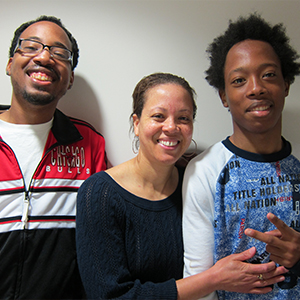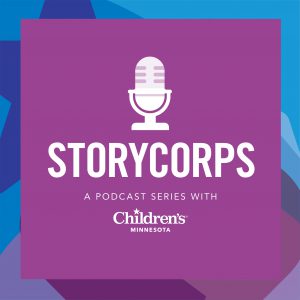Sickle Cell: Jalen, Anthony and Lenora’s story


About this episode
Mother, Lenora interviews sons: Jalen and Anthony (TJ), both are diagnosed with sickle cell. Although the brothers share a diagnosis, their experiences differ broadly.
Topics:
- Treatment: Medical experience
- Sickle cell crisis: Complications
- Resilience: Learning and faith
- Fears and challenges
Transcript
Lenora: Okay, I have a question. Jalen, what is the one word you would use to explain sickle cell?
Jalen: I would say painful, I guess. It’s an experience. It’s not something that you can just take away. It’ll be there for a little bit until we find a cure. How knows?
Lenora: TJ what’s the word that you would use to explain sickle cell?
TJ: Painful.
Lenora: Well, the one word that I would use to describe sickle cell is, I think I would describe it as struggle because I don’t experience the pain but I experience the struggle of trying to stay on top of sickle cell because a lot of times it rears its ugly head in a lot of different ways. It can be your gallbladder, it can be your lungs, or it could be your brain or it could be your lungs or your kidneys or your bones or your back. I think that I’ve just tried to show you guys that Sickle cell is something that you have, that’s not who you are, to have a life without it being all about sickle cell.
Jalen: What are some of the steps you take to try and keep me and TJ out of the hospital?
Lenora: I would try to cook healthy; salads every day. Have you drink lots of water. I spent a lot of money on fluids. Juice, water, lots and lots of money on that. and I try to get you to bed early. Dressed you warm, probably overdressed you most of the time. Keep you clean. I was almost obsessive with keeping your hands and face clean so you wouldn’t get infections. Make sure you took your medicine, got good rest, went to your doctor’s appointments. That’s what I tried to do. Okay. TJ, tell me what kind of illnesses have been related to you sickle cell that you’ve experienced.
TJ: Surgical wise, I had my gullet taken out, I had a brain surgery because I wasn’t getting enough oxygen in my head. Complications, I’ve had strokes.
Lenora: What advice would you and Jalen give to others who are going through sickle cell or who have just been diagnosed with sickle cell?
Jalen: The only thing I can say is that it’ll be okay. It’s not your fault. You can’t help what you were given. Don’t be a victim, be an example or be a hero or not a hero but be somebody that other sickle cell patients can look up to. At times, it can be hard, but nothing’s harder. You’ll get through it.
TJ: I’ve been in the hospital a lot in my lifetime with some sickle cell but I know that you if you do the stuff that the doctors tell you to do which is take your medicine, drink lots of water, get enough sleep. Those three steps will keep you out the hospital.
Lenora: What has life been like as you become more independent as an adult having sickle cell?
Jalen: It depends. Some days it’s hard. You go into an interview, have a new job, you’re like, ‘Dang, should I tell them if I have sickle cell or not?’ and you’re like, ‘This might affect my job, me getting a job or not.’ Other days, I don’t feel pain so I’m just glad I don’t feel pain. I try not to let it define me.
TJ: I like life. I enjoy my life, truthfully. Can work, have fun with my friends, my girlfriend whose very annoying, [inaudible] too much. I enjoy life, though. Sickle cell is just something I have, I don’t let it control me.
We wish to extend our thanks to the families who have shared their story here about the impact of living with hemophilia and sickle cell disease. We would also like to thank the many who worked on this project:
The Children’s Minnesota StoryCorps Legacy Team:
Eddie Gonzalez, Jocelyn Bessette Gorlin, Susan Kearney, Stephen Nelson, Margaret Heisel-Kurth, Stephanie Davis, Angela Blue, Elizabeth McDonough, Jill Swenson and Alisa Linne.
Special thanks to:
Stephanie Moua, Hamdi Hussein, Sadia Farah, Fatima Ali, Caillyn Costello, Suzanne Lehman, Suzan Ulrich, D'Ann Urbaniak Lesch, Justin Nelson, Allison Albright, Marvin Holmes-Leopold, Jose Rodriguez and Mitch Hare.
Minneapolis Institute for Production and Recording:
Jose Rodriguez and Mitch Hare.